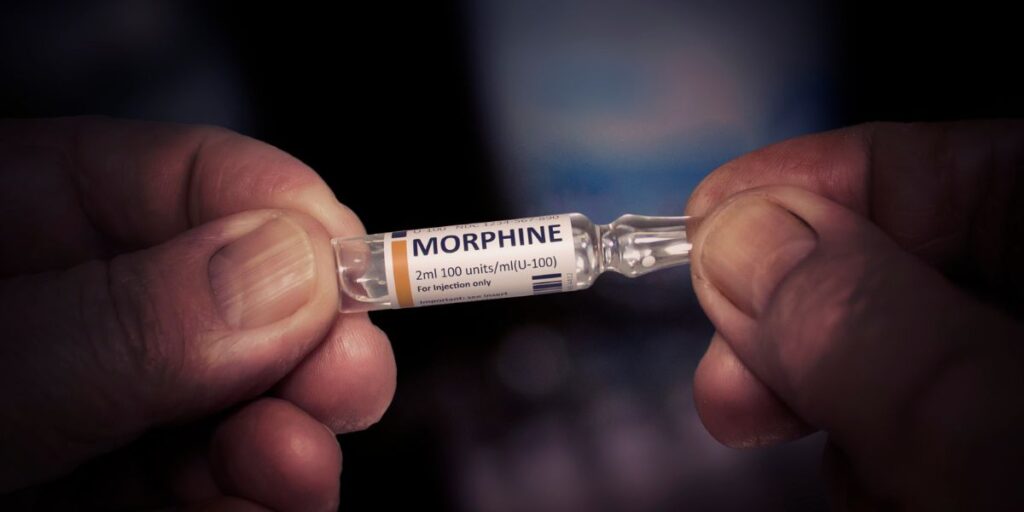Morphine Addiction Signs and Withdrawal


Many people use morphine during treatment for chronic pain and various health issues. Morphine has been used for a long time for pain relief. However, it remains one of the most addictive prescription drugs.
Morphine addiction may not always manifest in expected ways. It impacts people across all age groups and ethnic backgrounds. It’s important to know the signs of morphine addiction and the treatment options to prevent overdoses and help with recovery.
What Is Morphine?
Morphine is a strong pain medicine used to control moderate to severe pain, including chronic pain in patients with terminal illnesses. It is available in several formats, including extended-release capsules, oral tablets, liquid solutions, and skin patches.
Morphine is a kind of pain reliever that operates in the brain to diminish pain indications. It can also induce feelings of sleepiness and joy. These potent properties that render morphine effective in pain management also contribute to its high potential for addiction.

Signs of Morphine Addiction
The onset of morphine addiction and abuse can be subtle, particularly in people holding a legitimate prescription. Nonetheless, in cases involving terminally ill patients, healthcare professionals typically limit the prescription of narcotic pain medications to brief durations.
One sign of morphine addiction is when someone starts getting the drug from friends or family. Another sign is buying it illegally. Additionally, going to multiple doctors to get more prescriptions is also a sign of addiction.
Abusing morphine by using it without a prescription or not following the prescribed dosage and timing is classified as abuse.
Signs of morphine addiction may manifest physically, yet alterations in behavioral health are also significant indicators.
Common indicators of morphine addiction include:
- Concealing morphine use or lying about it
- Consuming morphine ahead of the next scheduled dose or in anticipation of pain
- Increasing dosage over time
- Struggling to discontinue morphine use
- Accumulating supplies of morphine
- Difficulty maintaining focus
- Ignoring personal and professional responsibilities
- Deterioration in personal grooming
- Experiencing mood fluctuations
- Withdrawal from social interactions
- Irregular sleep patterns
- Resorting to other substances or prescription drugs when morphine is unavailable
- Experiencing significant weight loss
- Developing tolerance to morphine’s effects
- Exhibiting withdrawal symptoms
Many people continue to use morphine because they are afraid of experiencing withdrawal symptoms. They also find it challenging to quit suddenly, even if they desire to stop. In such situations, substance abuse treatment may become necessary.
Some people can receive help for their addiction at an outpatient center. Others may require more intensive care, such as staying at a treatment facility.
Morphine Side Effects
People metabolize medication differently. Even if you take morphine as directed by your doctor, you may still experience side effects. If you are prescribed morphine, make sure to discuss any side effects with your healthcare provider or pharmacist. They can also help you monitor your needs and advise you on when to seek medical help.
Make sure to discuss any potential side effects with your healthcare provider or pharmacist. Ask about how often you should be monitored while taking morphine. Inquire about when it is necessary to seek medical help while on this medication.
The side effects of morphine may include:
- Sensations of extreme happiness
- Sleepiness
- Calmness
- Parched mouth
- Vomiting tendency
- Light-headedness
- Pain in the stomach and abdomen
- Irregular bowel movements
- Migraine
- Narrowed pupils
- Itchiness
- Skin irritation
- Trouble in swallowing
- Decreased hunger
- Perspiration
- Reduced respiratory rate
- Hypotension
Most side effects will subside on their own once you discontinue the use of morphine.
In case of a medical emergency or adverse reaction, immediately call 911 or contact poison control. Additionally, do not hesitate to call your doctor with any questions regarding concerns or side effects you are experiencing.
Let your doctor or pharmacist know if you take herbal remedies or other medications. This is important because they can increase the risk of severe side effects. It’s best to be transparent about all the substances you use to ensure your safety. Your healthcare provider needs this information to provide the best care.
Short-Term Effects of Morphine Abuse and Addiction
Morphine addiction has different effects than the side effects of the medication. These effects can be short-term or long-term. Addiction gradually deteriorates both the body and brain, resulting in significant physical and mental health consequences.
The short-term effects of morphine abuse may initially resemble its side effects. Over time, these problems may get worse and cause more serious issues if the addiction is not controlled.
Potential immediate side effects of morphine include:
- Bewilderment
- Bowel irregularity
- Regular nausea and vomiting
- Loss of weight
- Impaired or sluggish speech
- Trouble focusing
- Respiratory issues
- Weakness in muscles
- Fluctuations in heartbeat
- Emotional instability
- Dehydration
- An illusory feeling of wellness
- Disorientation
- Light-headedness
- Oversleeping
- Migraines
- Shivering

Morphine Addiction Withdrawal
Morphine withdrawal symptoms vary widely among individuals, ranging from uncomfortable to intense and potentially life-threatening. How long and how much morphine you use can affect how bad your withdrawal symptoms are.
Withdrawal symptoms can begin as soon as six hours after the last dose of morphine. Individuals who try to withdraw on their own or quit abruptly often relapse when the symptoms become overwhelming.
Typical symptoms of morphine withdrawal include:
- Pain in muscles
- Discomfort in joints
- Uneasiness
- Irritability
- Low mood
- Sleeplessness
- Agitation
- Oversleeping
- Perspiration
- Watery eyes and nasal discharge
- High temperature
- Migraine
- Intolerance to light and sound
- Heat and chill spells
- Quivering or shuddering
- Sickness and regurgitation
- Loose stools
- Fluid loss
- Elevated blood pressure
- Convulsions
- Unconsciousness
If you are worried about your health while withdrawing from morphine, it’s crucial to consult your physician about treatment alternatives before trying to stop. A lot of people might require medical supervision during detox to come off morphine safely.
Morphine Addiction Treatment at White Oak Recovery Center
If you or a loved one is battling drug abuse, we are ready to help. At White Oak Recovery Center, your meaningful and lasting recovery is our priority.
We provide comfortable medical detox with round-the-clock medical care at our private residential treatment center. This ensures your safety and helps manage withdrawal symptoms, allowing your personalized treatment plan to commence.
Allow our compassionate treatment specialists to help reclaim your life with White Oak Recovery Center. Reach out today.

Am I covered for addiction treatment?
Your insurance may cover treatment. Call now for an entirely free and confidential assessment. Recovery starts with a phone call.

- Murphy, Patrick B., et al., “Morphine.” StatPearls: National Library of Medicine, May 2023.
- Glare, Paul, et al., “The Adverse Effects of Morphine: A Prospective Survey of Common Symptoms During Repeated Dosing for Chronic Cancer Pain.” AM J Hosp Palliat. Care, Jul. 2006.
- “Morphine.” National Institute of Diabetes and Digestive and Kidney Diseases, Nov. 2020.
- Listos, Joanna, et al., “The Mechanisms Involved in Morphine Addiction: An Overview.” International Journal of Molecular Sciences, Sep. 2019.
- “Morphine.” MedlinePlus: National Library of Medicine, Mar. 2024.
Medical Disclaimer:







